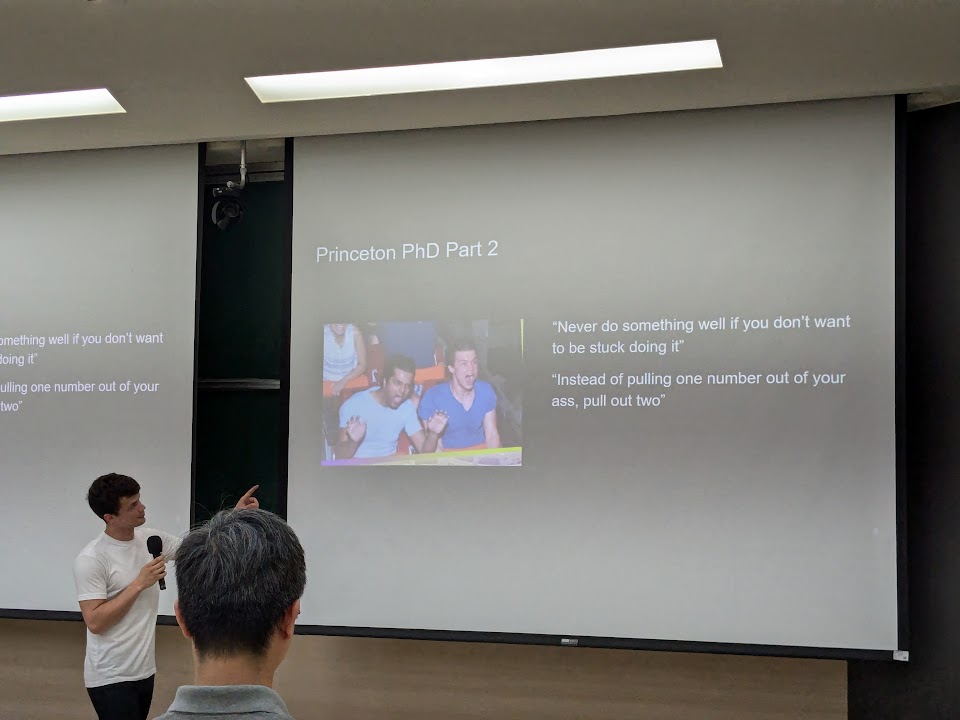Speech by Dr. Sergiy Popovych
A Cross-Cultural Journey: From NCTU to Princeton, and From Academy to AINeuroScience Startup

Dr. Sergiy Popovych, originally from Ukraine, obtained his bachelor's degree in Computer Science from National Chiao Tung University in 2014. He then pursued and completed both his master’s and doctoral degrees at Princeton University. Throughout his academic journey, Dr. Popovych established a startup that successfully secured $11 million in investment from Y Combinator, Princeton University startup accelerator. He is currently serving as the Chief Technology Officer (CTO) at Zetta AI, a company dedicated to neuroscience research.
On June 24, 2024, Dr. Popovych revisited his alma mater to deliver a speech. He recounted his journey from studying computer science in Taiwan to leading a computational neuroscience startup in the United States. Dr. Popovych detailed how his work on large-scale computer vision applications at Princeton University played a crucial role in securing startup investment during his doctoral studies. He also discussed the challenges of raising venture capital in today’s competitive landscape and highlighted his successes in this area. Additionally, he introduced his current role as Chief Technology Officer at Zetta AI, explaining how he and his team leverage artificial intelligence to analyze brain tissue data. Dr. Popovych also shared insights into the latest advancements in AI, as well as the challenges that need to be addressed before these technologies can be effectively applied to human brain analysis.
In the first half of his speech, Dr. Popovych shared his educational journey, which began with EDA research at National Chiao Tung University. He then transitioned to a compiler research lab at Princeton University. When his advisor shifted research focus, Dr. Popovych's exceptional software development skills, honed through his work on compilers, attracted the attention of other professors and led him to a lab focused on AI research. During his studies, he and his classmates co-founded Activeloop, a company offering GPU and other computing rental services. Their initial demo secured a $1 million investment; however, the venture ultimately failed due to changes in visa regulations and disagreements with co-investors. Dr. Popovych compared the entrepreneurial environments of Taiwan and the U.S., noting that in America, the startup scene is dynamic, with nearly every student eager to raise funds and launch ventures, often without a well-defined proposal. While Taiwanese students demonstrate great confidence and are equally, if not more, skilled in engineering, he expressed confusion about why Taiwan, despite its abundance of talented engineers, lacks a robust startup industry. He speculated that challenges with fundraising or cultural differences might be to blame.
Dr. Popovych discussed his current research at Zetta AI, where he is employing artificial intelligence to advance the field of neuroscience, in the second half of his speech. Given the inherent complexity of neural tissue, Dr. Popovych and his team use AI to analyze a series of 2D electron microscopy images of brain tissue slices, reconstructing the 3D architecture of individual neurons and their synaptic connections. They face challenges such as tissue jitter, potential rupturing, or folding during the slicing process, which can cause significant discrepancies between consecutive images, and the lack of ground truth data necessary to train the AI. To address these issues, Zetta AI combines traditional image processing techniques, such as optical flow, with self-supervised learning methods. Dr. Popovych believes that integrating AI with conventional techniques is a more practical and feasible approach than relying on either method alone.
Dr. Popovych emphasized the importance of using AI in neuroscience research, particularly from a funding perspective. Zetta AI's primary investors include U.S. government agencies such as the National Institutes of Health (NIH) and the Intelligence Advanced Research Projects Activity (IARPA). For NIH, advancing research on mental health and other conditions requires a deep understanding of the human brain and nervous system. This research demands effective tools for analyzing brain tissue. Just as the Human Genome Project used computers and algorithms to accelerate gene sequencing, AI technology has the potential to significantly expedite neuroscience research. With AI's growing prominence globally and the push to advance AI technologies, IARPA is making substantial investments in AI startups to build technological capabilities and foster innovation.